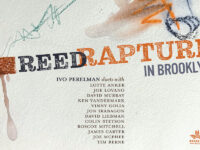In case you don’t know already, saxophone sage Ivo Perelman recently undertook the audacious project of recording and releasing entirely improvised duets with not one but 12 different reedists. These face-offs were packaged together in the voluminous 12-part box set Reed Rapture in Brooklyn. This is way too much saxophone goodness to survey in a single post, so yours truly picked out a handful of these ad hoc matchups and gave each of these its own spotlight.
We’re looking this time at a Perelman duet where Perelman’s foil comes from the prior generation, like the Reed Rapture duet we previously examined. Joe McPhee is a New Thing legend like Roscoe Mitchell, arriving in the late 60s as one of the immediate heirs to Albert Ayler. The guy’s got earnest humanity and spirituality coming out of his tenor by the buckets, qualities that for certain attracted him to Perelman. McPhee’s tenor tone is distinctive in that it almost goes as deep down as a baritone, a burly sound that can be equally brutish and beguiling in its direct soulfulness. That makes him a fine complement to Perelman, who is equally adaptable and complementary to both of those sides.
McPhee, above all, is dauntless. Accordingly, this is a collaboration full of invention and the emotional range of this music is colossal.
A lightly bouncing waltz quickly ensues on “Eight” and after each round of the pattern they devised on the spot, a release follows. The surprises don’t stop there. On one stretch over “Three,” Perelman flies high and briefly, McPhee reaches up to meet him, then in an instant goes back to the opposite side of the register again.
Vocalizing is viewed by both musicians as simply an extension of their sax expressions and can be heard on both “Three” and “Four.” It’s a strong indication of how they allow themselves to be possessed by the moment of creating music together, like a seance calling out the muses. Heck, on “Two,” McPhee is downright testifying on a couple of occasions. The two tend toward playing extended notes here and on “One,” showing that passion doesn’t always mandate urgency and end both performances by chopping it up.
“Five” is a greater focus on harmony, as Perelman comps on the two-chord riff while McPhee digs deep inside himself to come up with his ardent wails. Perelman and McPhee forge a dirge-like melody that underlies “Six” and as the former holds down the pattern, the latter goes up high to convey a mournful release, unwinding down from the peak to bring the piece to a restful close.
Reed Rapture in Brooklyn is currently available through Mahakala Music. Get it here.
- Claudio Scolari Project – ‘Bloom’ (2025) - June 12, 2025
- Denny Zeitlin – ‘With a Song In My Heart: Exploring The Music of Richard Rodgers’ (2025) - June 4, 2025
- Ches Smith Quartet – ‘Clone Row’ (2025) - May 30, 2025




